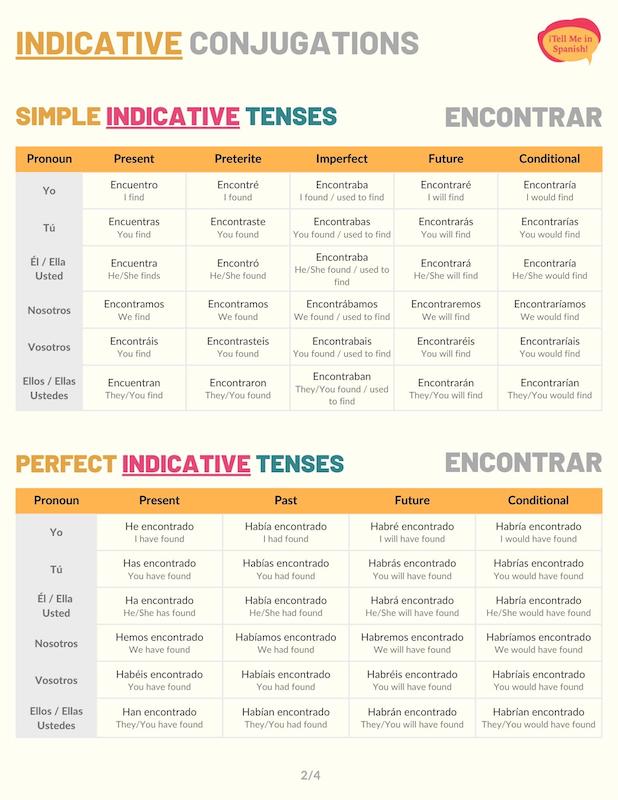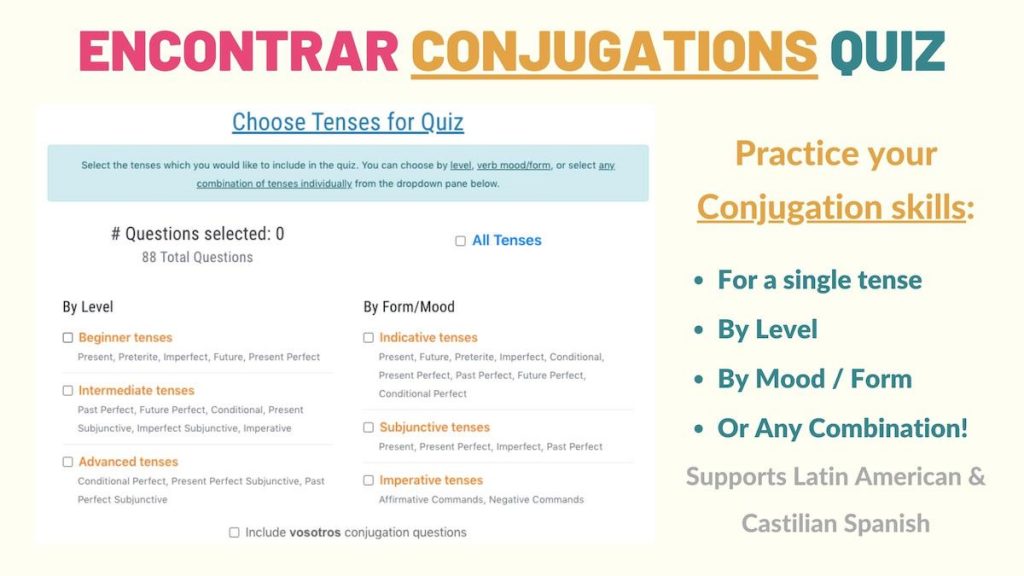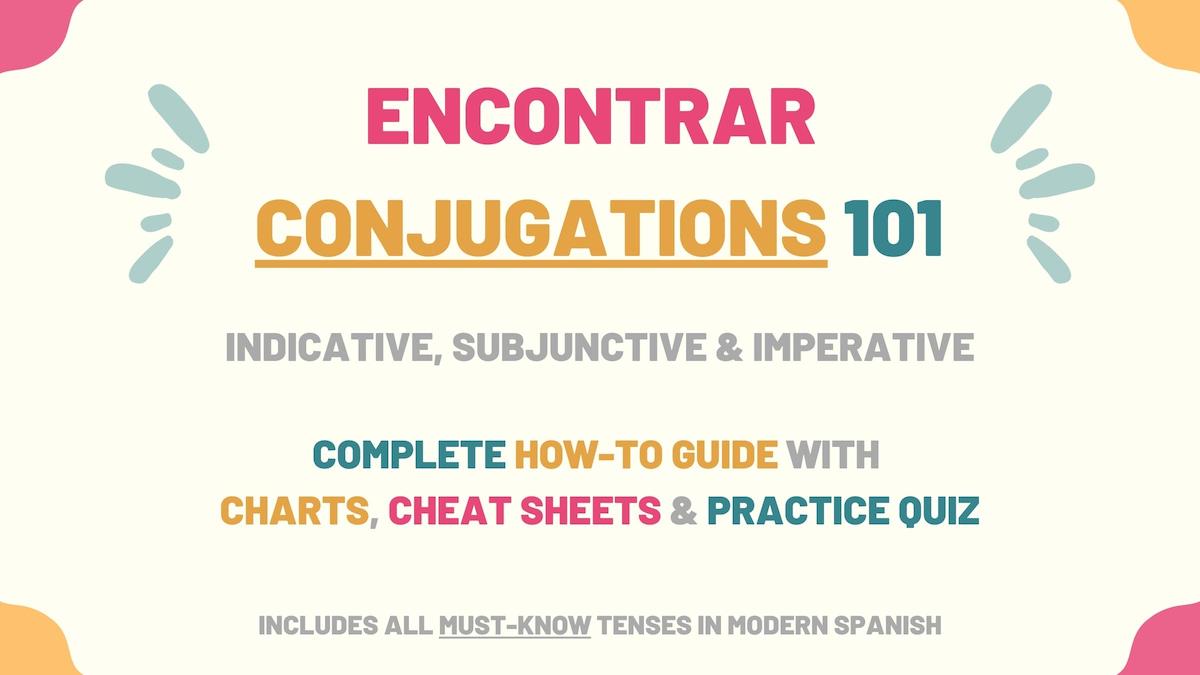Encontrar is an -AR verb with O to UE stem changes. Since this verb can help you practice this pattern, in this guide, we’ll go over encontrar conjugation charts. Here is what we’ll cover:
- Encontrar Overview
- Indicative Tenses of Encontrar Conjugations
- Subjunctive Tenses of Encontrar Conjugations
- Imperative (Commands) of Encontrar Conjugations
- Uses & Examples
- Download Encontrar Conjugation Tables & Uses Cheat sheets
- Encontrar Conjugation Practice Quiz
Overview of Encontrar
| Verb Characteristic | Property |
|---|---|
| Verb Type | -AR |
| Irregular | No |
| Infinitive | Encontrar |
| Gerund (Present Participle) Form | Encontrando |
| Past Participle Form | Encontrado |
| Synonyms | Hallar, localizar. |
Stem Changes: O to UE
- Present indicative: encuentr for all subjects except ‘nosotros’ and ‘vosotros’.
- Present subjunctive: encuentr for all subjects except ‘nosotros’ and ‘vosotros’.
- Negative and affirmative imperative: encuentr for all subjects except ‘vosotros’.
Indicative Conjugations of Encontrar
Present tense
Encontrar conjugations for the present tense have an O to UE stem change. This change is not applied to ‘nosotros’ or ‘vosotros’. Use encontrar in the present tense to talk about what people currently find. For instance: No encuentro mis llaves.
| Person | Conjugation | Translation |
|---|---|---|
| Yo | Encuentro | I find |
| Tú | Encuentras | You find |
| Él / Ella Usted | Encuentra | He/She finds You (formal) find |
| Nosotros | Encontramos | We find |
| Vosotros | Encontráis | You find |
| Ellos / Ellas Ustedes | Encuentran | They find You (plural) find |
Preterite tense
Encontrar preterite conjugations are regular. Conjugate encontrar to this tense to express that someone found something or point out the exact moment something was found. For example: Ya encontramos la cartera de Tom.
| Person | Conjugation | Translation |
|---|---|---|
| Yo | Encontré | I found |
| Tú | Encontraste | You found |
| Él / Ella Usted | Encontró | He/She found You (formal) found |
| Nosotros | Encontramos | We found |
| Vosotros | Encontrasteis | You found |
| Ellos / Ellas Ustedes | Encontraron | They found You (plural) found |
Imperfect tense
Use encontrar’s past imperfect tense conjugations to refer to things or people you used to find in the past. You can also use these forms if it’s unclear when something or someone was found. Susana nunca encontraba sus calcetines.
| Person | Conjugation | Translation |
|---|---|---|
| Yo | Encontraba | I found I used to find |
| Tú | Encontrabas | You found You used to find |
| Él / Ella Usted | Encontraba | He/She found He/She used to find You (formal) found You (formal) used to find |
| Nosotros | Encontrábamos | We found We used to find |
| Vosotros | Encontrabais | You found You used to find |
| Ellos / Ellas Ustedes | Encontraban | They found They used to find You (plural) found You (plural) used to find |
Near future
The Spanish immediate future is formed with ir a + infinitive (in this case, ‘encontrar’). We use this tense to talk about what people are going to find soon in the future. For example: Ya no vamos a encontrar más galletas.
| Person | Conjugation | Translation |
|---|---|---|
| Yo | Voy a encontrar | I’m going to find |
| Tú | Vas a encontrar | You’re going to find |
| Él / Ella Usted | Va a encontrar | He/She is going to find You (formal) are going to find |
| Nosotros | Vamos a encontrar | We’re going to find |
| Vosotros | Vais a encontrar | You’re going to find |
| Ellos / Ellas Ustedes | Van a encontrar | They’re going to find You (plural) are going to find |
Future simple tense
When conjugated to the future tense, encontrar communicates that someone will find something or another person at some point in the future. Siempre te encontraré.
| Person | Conjugation | Translation |
|---|---|---|
| Yo | Encontraré | I will find |
| Tú | Encontrarás | You will find |
| Él / Ella Usted | Encontrará | He/She will find You (formal) will find |
| Nosotros | Encontraremos | We will find |
| Vosotros | Encontraréis | You (formal) will find |
| Ellos / Ellas Ustedes | Encontrarán | They will find You (plural) will find |
Conditional tense
Conjugate encontrar to the conditional tense to talk about what people would find if some conditions were met. You can also use these conjugations to hypothesize what you or someone else would find. For example: Creí que nunca te encontraría.
| Person | Conjugation | Translation |
|---|---|---|
| Yo | Encontraría | I would find |
| Tú | Encontrarías | You would find |
| Él / Ella Usted | Encontraría | He/She would find You (formal) would find |
| Nosotros | Encontraríamos | We would find |
| Vosotros | Encontraríais | You would find |
| Ellos / Ellas Ustedes | Encontrarían | They would find You (plural) would find |
Present perfect tense
The Spanish present perfect of ‘encontrar’ is conjugated with the formula haber in the present tense + encontrado (past participle). In the present perfect tense, this verb refers to the things someone has or hasn’t found. No hemos encontrado a Diana.
| Person | Conjugation | Translation |
|---|---|---|
| Yo | He encontrado | I have found |
| Tú | Has encontrado | You have found |
| Él / Ella Usted | Ha encontrado | He/She has found You (formal) have found |
| Nosotros | Hemos encontrado | We have found |
| Vosotros | Habéis encontrado | You have found |
| Ellos / Ellas Ustedes | Han encontrado | They have found You (plural) have found |
Past perfect
The Spanish past perfect of encontrar is used to talk about what someone had found before some other reference point in the past. Me dijiste que ya las habías encontrado. To form the past perfect, use the imperfect conjugations of ‘haber’ and the past participle form of ‘encontrar’.
| Person | Conjugation | Translation |
|---|---|---|
| Yo | Había encontrado | I had found |
| Tú | Habías encontrado | You had found |
| Él / Ella Usted | Había encontrado | He/She had found You (formal) had found |
| Nosotros | Habíamos encontrado | We had found |
| Vosotros | Habíais encontrado | You had found |
| Ellos / Ellas Ustedes | Habían encontrado | They had found You (plural) had found |
Future perfect
We use the future perfect tense of ‘encontrar’ to express that someone will have found something or someone by or before a certain moment in the future. You can also use this tense to talk about what someone might have found.
For example: ¿Crees que Josh habrá encontrado su cartera?
| Person | Conjugation | Translation |
|---|---|---|
| Yo | Habré encontrado | I will have found |
| Tú | Habrás encontrado | You will have found |
| Él / Ella Usted | Habrá encontrado | He/She will have found You (formal) will have found |
| Nosotros | Habremos encontrado | We will have found |
| Vosotros | Habréis encontrado | You will have found |
| Ellos / Ellas Ustedes | Habrán encontrado | They will have found You (plural) will have found |
Conditional perfect
Conjugate encontrar to the Spanish conditional perfect tense to communicate that someone would have found something or someone as long as a past condition had been met. These conjugations are also used to make hypotheses about what someone found in the past.
For instance: No habría encontrado mi celular sin tu ayuda.
| Person | Conjugation | Translation |
|---|---|---|
| Yo | Habría encontrado | I would have found |
| Tú | Habrías encontrado | You would have found |
| Él / Ella Usted | Habría encontrado | He/She would have found You (formal) would have found |
| Nosotros | Habríamos encontrado | We would have found |
| Vosotros | Habríais encontrado | You would have found |
| Ellos / Ellas Ustedes | Habrían encontrado | They would have found You (plural) would have found |
Progressive tenses
Use the progressive tenses of encontrar to talk about what someone is finding at the moment of speaking. Creo que están encontrado más información. The progressive tenses are formed with estar (conjugated) + present participle (encontrando, in this case).
| Progressive Tense | Formula | Translation Example |
|---|---|---|
| Present | Estar (present) + encontrando | I am finding |
| Preterite | Estar (preterite) + encontrando | You were finding |
| Imperfect | Estar (imperfect) + encontrando | He was finding |
| Future | Estar (future) + encontrando | We will be finding |
| Conditional | Estar (conditional) + encontrando | They would be finding |
Encontrar Subjunctive Conjugations
The Spanish subjunctive mood refers to wishes, requests, suggestions, expectations, doubts, or hypothetical situations. Below are the encontrar conjugation charts for the most common subjunctive tenses.
Present subjunctive
Encontrar subjunctive conjugations have an O to UE stem change for all subjects except ‘nosotros’ and ‘vosotros’. We use these conjugations to request or wish that someone finds or doesn’t find something. For instance: Ojalá no encuentren nada.
| Person | Conjugation | Translation |
|---|---|---|
| Yo | Encuentre | I find |
| Tú | Encuentres | You find |
| Él / Ella Usted | Encuentre | He/She finds You (formal) find |
| Nosotros | Encontremos | We find |
| Vosotros | Encontréis | You find |
| Ellos / Ellas Ustedes | Encuentren | They find You (plural) find |
Present perfect subjunctive
Haber in the present subjunctive + encontrado is the formula we use to conjugate encontrar to the present perfect subjunctive. Use this tense to wonder or wish that someone has already found something. Espero que hayan encontrado mis llaves.
| Person | Conjugation | Translation |
|---|---|---|
| Yo | Haya encontrado | I have found |
| Tú | Hayas encontrado | You have found |
| Él / Ella Usted | Haya encontrado | He/She has found You (formal) have found |
| Nosotros | Hayamos encontrado | We have found |
| Vosotros | Hayáis encontrado | You have found |
| Ellos / Ellas Ustedes | Hayan encontrado | They have found You (plural) have found |
Imperfect subjunctive
When conjugated to the imperfect subjunctive, encontrar refers to past requests, suggestions, and wishes you had about someone finding something. For example: Me hubiera gustado que encontraran a mi perro
These are two types of conjugations for the imperfect subjuntive. Using one or the other depends on the type of Spanish you use:
Latin American Spanish version
| Person | Conjugation | Translation |
|---|---|---|
| Yo | Encontrara | I found |
| Tú | Encontraras | You found |
| Él / Ella Usted | Encontrara | He/She found You (formal) found |
| Nosotros | Encontráramos | We found |
| Ellos / Ellas Ustedes | Encontraran | They found You (plural) found |
Note: In Latin American Spanish, the pronoun vosotros is not used. As a result, this pronoun has been excluded from this encontrar conjugation chart.
Castilian Spanish version
| Person | Conjugation | Translation |
|---|---|---|
| Yo | Encontrase | I found |
| Tú | Encontrases | You found |
| Él / Ella Usted | Encontrase | He/She found You (formal) found |
| Nosotros | Encontrásemos | We found |
| Vosotros | Encontraseis | You found |
| Ellos / Ellas Ustedes | Encontrasen | They found You (plural) found |
Past perfect subjunctive
In the past perfect subjunctive, encontrar expresses that someone would have found something if a past circumstance was met. Additionally, these conjugations also refer to regrets or hypothetical outcomes if you had found something or someone.
For instance: Si hubiera encontrado mis llaves, no habría llamado al cerrajero.
| Person | Conjugation | Translation |
|---|---|---|
| Yo | Hubiera encontrado | I had found |
| Tú | Hubieras encontrado | You had found |
| Él / Ella Usted | Hubiera encontrado | He/She had found You (formal) had found |
| Nosotros | Hubiéramos encontrado | We had found |
| Vosotros | Hubierais encontrado | You had found |
| Ellos / Ellas Ustedes | Hubieran encontrado | They had found You (plural) had found |
Encontrar Imperative Conjugations
In Spanish, we use the imperative conjugations to give orders to people.
Affirmative commands
If you want to order someone to find something, you must use the affirmative imperative. Encontrar affirmative commands use the stem changing root encuentr for all subjects except ‘vosotros’. Here is an example: Vayan y encuentren mi dinero.
| Person | Conjugation | Translation |
|---|---|---|
| Tú | Encuentra | Find |
| Usted | Encuentre | Find |
| Vosotros | Encontrad | Find |
| Ustedes | Encuentren | Find |
Negative commands
Check the encontrar conjugation chart below. To form negative commands, you must use the stem encuentr for all subjects except ‘vosotros’. Sentences that use encontrar’s negative imperative are uncommon because you cannot command people not to find something.
| Person | Conjugation | Translation |
|---|---|---|
| Tú | No encuentres | Don’t find |
| Usted | No encuentre | Don’t find |
| Vosotros | No encontréis | Don’t find |
| Ustedes | No encuentren | Don’t find |
Meanings of Encontrar & Examples
Since you already learned how to conjugate encontrar, here are some examples of how to use this verb correctly.
- Talking about finding or discovering things
(Direct object pronoun) + [encontrar conjugated] + (noun)
¿La encontraste?
Did you find her?
Ojalá pronto encuentres tus cosas.
I hope you find your things soon.
Take Note: When the context is clear, you can replace the thing or person you find with a Spanish direct object pronoun.
- As a synonym of ‘coming across’ or ‘bumping into’
[Reflexive pronoun] + [encontrar conjugated] + a + [noun]
Ayer me encontré a Carmen.
Yesterday, I bumped into Carmen.
Tú siempre te encuentras dinero en la calle.
You always come across money in the street.
Download Encontrar Conjugation Tables & Uses Cheat sheets

Click the button below to download the cheat sheets PDF I’ve assembled with all of the encontrar conjugation charts, meanings, and uses so you can study them at your own pace.
Practice Quiz: Encontrar Conjugation

Practice your conjugation skills for ‘encontrar’ by taking our verb conjugation practice quiz, where you can choose any combination of tenses you’d like to focus on.



